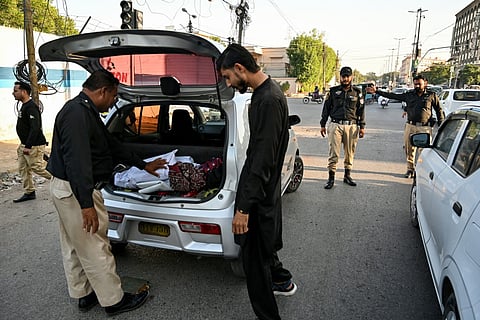Pakistan tightens Islamabad security after suicide blast
Funeral prayers held for victims, while most of 27 wounded had been discharged

ISLAMABAD: Residents in the Pakistani capital faced tightened security checks on Wednesday in the wake of a suicide bombing that left top officials vowing to halt the rise in deadly attacks.
The blast outside the district court buildings on Tuesday was claimed by a faction of the Pakistani Taliban, a militant group behind a string of assaults across the country.
The district court remained closed on Wednesday, while security was stepped up at other court complexes across the city. Long queues of vehicles formed at checkpoints.
“Our army, police, and all law enforcement agencies are alert and performing their duties. Unfortunately, the question remains: where are these attacks coming from, and how are they happening?” said resident Fazal Satar, 58.
At least 12 people were killed and 27 wounded in the bombing — the first such attack in the capital in nearly three years.
“It was a very powerful explosion,” said Muhammad Imran, a 42-year-old police official who was wounded in the attack. “It was a very sudden bang, and I felt like someone had thrown me to the ground,” he told AFP.
Also Read: The world can’t ignore Kashmir: Imran Khan
Sharjeel Ahmed, a 26-year-old student, voiced concern over how the violence could affect foreign investment and Pakistan’s ability to host international sporting events.
“In my opinion, this is a serious security lapse, and we must learn from it. If such attacks continue, how will the world trust us?” he said.
Pakistan has seen an uptick in violence since the Afghan Taliban returned to power in 2021, and bilateral relations between the neighbours have deteriorated in recent weeks.
The worst cross-border fighting in years killed more than 70 people last month, including dozens of Afghan civilians, according to the United Nations.
In Pakistan, the TTP has threatened more attacks until Islamic law is fully implemented in the Muslim-majority nation.
Hafiz Mazhar Malik Javeed, a lawyer burying a colleague killed in the suicide bombing, feared for the future.
Funeral prayers
“All the judges and lawyers were afraid,” said the 45-year-old at the cemetery. “We thought maybe after some time, they will attack us again.”
Meanwhile, Pakistanis buried their loved ones on Wednesday as authorities probed the attack. Forensic teams and police combed through debris at the blast site, which was sealed to preserve evidence. Across the city, grief-stricken relatives received the bodies of their loved ones at an Islamabad hospital.
Funeral prayers were held for several victims, while most of the 27 wounded had been discharged after treatment.
The Islamabad attack drew widespread condemnation from the international community.
Defence Minister Khawaja Asif told Geo News that the bombing was “a message for Pakistan” meant to show that insurgents could still strike deep inside the country.
Asked whether Pakistan would retaliate and target TTP hideouts in Afghanistan, he said “it cannot be ruled out,” again urging Kabul to rein in militants operating from its soil.
Attack on a military-run college
On Monday night, four militants targeted an army-run college for cadets in the northwestern city of Wana. Police said all four attackers — including a suicide car bomber — were killed, and more than 600 people, including 525 cadets, teachers, and staff, were safely rescued during the overnight assault.
The attack began when a suicide bomber rammed an explosives-laden vehicle into the college gate. Troops quickly fanned out across the campus to prevent the attackers from reaching the buildings where cadets and staff had taken shelter.
Footage aired on Pakistani news channels Wednesday showed soldiers evacuating students using wooden ladders and breaking windows to enter the dormitories.
Information Minister Attaullah Tarar said the attackers appeared to be attempting a repeat of the 2014 Peshawar school massacre — the deadliest attack on a school in Pakistan — when a TTP faction killed 154 people, mostly children, at an army-run school in Peshawar.
Foreign Minister Ishaq Dar told a gathering in Islamabad on Wednesday that the two attacks — in Islamabad and Wana — had killed at least 15 people. His remarks indicated that Pakistani forces suffered at least three fatalities at the cadet school.
Sign up for the Daily Briefing
Get the latest news and updates straight to your inbox



